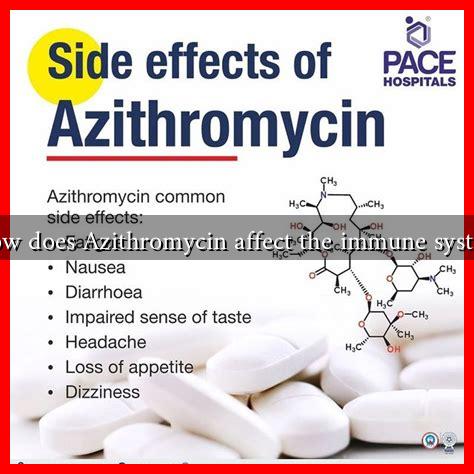-
Table of Contents
How Does Azithromycin Affect the Immune System?
Azithromycin, a widely used macrolide antibiotic, is primarily known for its effectiveness against various bacterial infections. However, its impact on the immune system has garnered increasing attention in recent years. This article delves into how azithromycin interacts with the immune system, its potential immunomodulatory effects, and the implications for clinical practice.
Understanding Azithromycin
Azithromycin is a semi-synthetic derivative of erythromycin, and it is commonly prescribed for respiratory infections, skin infections, and sexually transmitted diseases. Its mechanism of action involves inhibiting bacterial protein synthesis, which ultimately leads to the death of the bacteria. However, azithromycin’s role extends beyond its antibacterial properties.
Immunomodulatory Effects of Azithromycin
Recent studies have suggested that azithromycin may possess immunomodulatory properties, influencing the immune response in various ways. Here are some key effects:
- Anti-inflammatory Properties: Azithromycin has been shown to reduce inflammation by inhibiting the production of pro-inflammatory cytokines. This can be particularly beneficial in conditions characterized by excessive inflammation, such as chronic obstructive pulmonary disease (COPD).
- Enhancement of Immune Response: Some research indicates that azithromycin may enhance the activity of certain immune cells, such as macrophages and neutrophils, which play a crucial role in the body’s defense against pathogens.
- Impact on T Cells: Azithromycin may influence T cell function, promoting a balanced immune response. This is particularly relevant in the context of viral infections, where an overactive immune response can lead to tissue damage.
Case Studies and Research Findings
Several studies have explored the immunomodulatory effects of azithromycin, providing valuable insights into its role in immune regulation:
- COVID-19 Research: During the COVID-19 pandemic, azithromycin was investigated for its potential to reduce inflammation and improve outcomes in patients with severe respiratory symptoms. A study published in the journal Nature found that azithromycin could modulate the immune response, although its efficacy as a standalone treatment was debated.
- Chronic Inflammatory Diseases: Research has indicated that azithromycin may benefit patients with chronic inflammatory conditions, such as cystic fibrosis and bronchiectasis, by reducing airway inflammation and improving lung function.
- Autoimmune Disorders: Some studies suggest that azithromycin may have a role in managing autoimmune diseases by modulating the immune response, although more research is needed to establish definitive conclusions.
Potential Risks and Considerations
While azithromycin has potential benefits for the immune system, it is essential to consider the risks associated with its use:
- Antibiotic Resistance: Overuse of azithromycin can contribute to antibiotic resistance, making it less effective for treating bacterial infections.
- Cardiovascular Risks: Azithromycin has been associated with an increased risk of cardiovascular events, particularly in patients with pre-existing heart conditions.
- Drug Interactions: Azithromycin can interact with other medications, potentially leading to adverse effects.
Conclusion
Azithromycin is more than just an antibiotic; it has significant immunomodulatory effects that can influence the immune system’s response to infections and inflammation. While its potential benefits in managing chronic inflammatory diseases and modulating immune responses are promising, caution is warranted due to the risks of antibiotic resistance and cardiovascular issues. As research continues to evolve, healthcare professionals must weigh the benefits and risks of azithromycin in clinical practice, ensuring that it is used judiciously to maximize patient outcomes.
In summary, azithromycin’s role in the immune system is multifaceted, and understanding its effects can lead to better therapeutic strategies in managing various diseases. Further research is essential to fully elucidate its immunomodulatory mechanisms and optimize its use in clinical settings.

